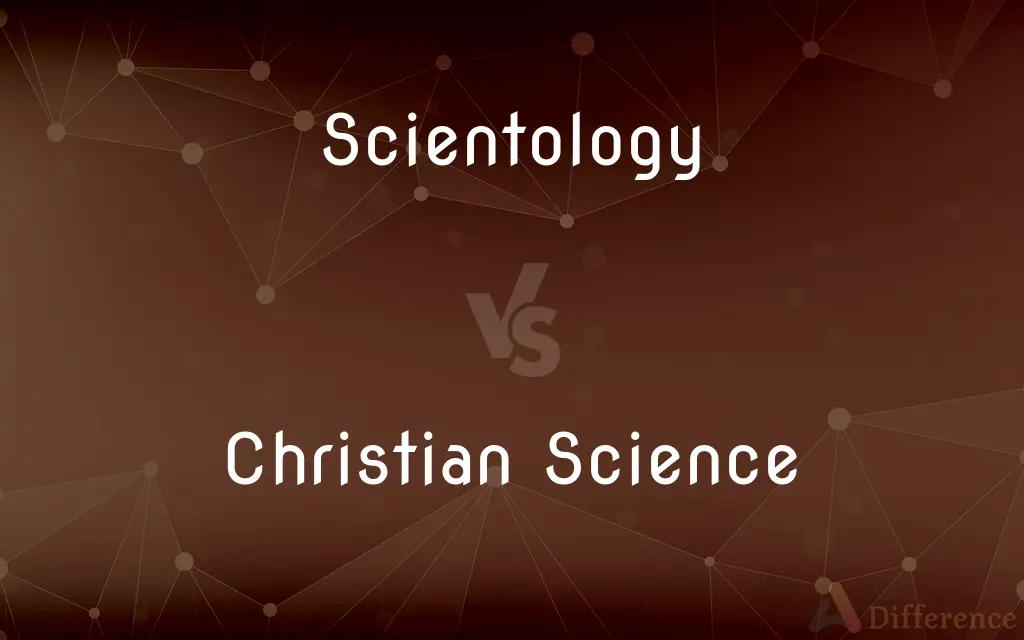Scientology vs. Christian Science — What's the Difference?
By Tayyaba Rehman — Published on January 23, 2024
Scientology, founded by L. Ron Hubbard, focuses on spiritual rehabilitation, while Christian Science, founded by Mary Baker Eddy, emphasizes healing through prayer and understanding of God.

Difference Between Scientology and Christian Science
Table of Contents
ADVERTISEMENT
Key Differences
Scientology, established by L. Ron Hubbard in the 1950s, is a movement that offers a path to spiritual enlightenment and self-knowledge through a method called auditing. Christian Science, founded in the late 19th century by Mary Baker Eddy, is a Christian denomination that emphasizes healing through prayer and a spiritual understanding of God.
Scientology’s beliefs are based on Hubbard’s writings, particularly "Dianetics," and do not align with traditional Christian teachings. Christian Science views Jesus Christ as a spiritual healer and central figure, interpreting the Bible in the context of healing and spiritual understanding.
In Scientology, the concept of thetans (immortal spiritual beings) and past life experiences are central to its beliefs. Christian Science, on the other hand, focuses on the immediacy of healing and salvation in this life, rooted in a Christian biblical perspective.
Scientology operates the Church of Scientology and its affiliated organizations, offering courses and auditing for spiritual development. Christian Science has the Church of Christ, Scientist, with services and Sunday Schools based on the Bible and Eddy’s writings.
Practices in Scientology include auditing sessions, where individuals recount events in their past to gain clarity and spiritual freedom. Christian Science practices primarily involve prayer and study of the Bible and Eddy’s work, "Science and Health with Key to the Scriptures."
ADVERTISEMENT
Comparison Chart
Founder
L. Ron Hubbard
Mary Baker Eddy
Key Beliefs
Thetans, auditing, spiritual rehabilitation
Healing through prayer, understanding of God
Relation to Christianity
Not based on Christian teachings
Christian denomination, focuses on Jesus’ teachings
Practices
Auditing, courses on Dianetics
Prayer, study of the Bible and Eddy’s writings
Central Texts
"Dianetics"
The Bible, "Science and Health with Key to the Scriptures"
Compare with Definitions
Scientology
Scientology is a belief system based on L. Ron Hubbard’s teachings.
Scientology’s auditing sessions aim to help individuals explore their past.
Christian Science
Centers around the teachings of Jesus Christ.
Christian Science views Jesus as a spiritual healer.
Scientology
Emphasizes spiritual enlightenment and self-knowledge.
He joined Scientology to seek spiritual growth.
Christian Science
Christian Science is a Christian denomination focusing on spiritual healing.
Christian Science emphasizes healing through prayer.
Scientology
Uses auditing to explore past life experiences.
Auditing in Scientology is a unique spiritual practice.
Christian Science
Interprets the Bible in the context of healing and spirituality.
Christian Science offers a unique interpretation of the Bible.
Scientology
Not aligned with traditional Christian beliefs.
Scientology differs significantly from mainstream Christianity.
Christian Science
Practices include prayer and study of religious texts.
She attends the Christian Science Sunday School regularly.
Scientology
Has its own churches and community organizations.
The Church of Scientology hosts various community events.
Christian Science
Founded by Mary Baker Eddy in the 19th century.
Mary Baker Eddy’s teachings are central to Christian Science.
Scientology
A new religion founded by L. Ron Hubbard in 1955 and characterized by a belief in the power of a person's spirit to clear itself of past painful experiences through self-knowledge and spiritual fulfillment
Common Curiosities
Can anyone participate in Scientology auditing?
Yes, auditing in Scientology is available to anyone interested, although it often requires financial payment.
Does Scientology believe in God or a supreme being?
Scientology acknowledges the concept of a supreme being, but its understanding and interpretation are unique to its doctrines.
Do Christian Scientists go to doctors?
While some Christian Scientists may choose medical care, they generally rely on prayer for healing, consistent with their beliefs.
What is the Christian Science Reading Room?
A Christian Science Reading Room is a place for public reading and study of Christian Science literature, including the Bible and Eddy's writings.
How do Christian Scientists view Jesus Christ?
Christian Scientists view Jesus as a spiritual healer and moral teacher but do not focus on his divinity in the same way as traditional Christianity.
Is Scientology considered a religion or a philosophy?
Scientology is officially recognized as a religion in many countries.
What is the Sea Organization in Scientology?
The Sea Organization, or Sea Org, is a dedicated group within Scientology that operates its most important functions.
Are there Christian Science churches worldwide?
Yes, there are Christian Science churches and societies around the world.
Is Dianetics the same as Scientology?
Dianetics, developed by L. Ron Hubbard, is a set of ideas and practices that laid the foundation for Scientology.
Can children participate in Christian Science practices?
Yes, children can participate in Christian Science practices, and many Christian Science churches offer Sunday School for young members.
How does Scientology view psychiatry and psychology?
Scientology is openly critical of psychiatry and psychology, viewing them as harmful.
Is prayer used in Scientology practices?
Scientology does not typically use prayer in its practices, focusing instead on auditing and coursework.
What is the Bridge to Total Freedom in Scientology?
It's a symbolic representation of the path Scientologists follow towards spiritual enlightenment.
Is Christian Science related to other Christian denominations?
Christian Science is a distinct denomination with unique beliefs, though it originates from Christian traditions.
Do Christian Scientists celebrate religious holidays?
Christian Scientists may observe religious holidays, but they emphasize the spiritual significance rather than traditional celebrations.
Share Your Discovery

Previous Comparison
Grammy Awards vs. Academy Awards
Next Comparison
Toyota Fortuner vs. Toyota 4RunnerAuthor Spotlight
Written by
Tayyaba RehmanTayyaba Rehman is a distinguished writer, currently serving as a primary contributor to askdifference.com. As a researcher in semantics and etymology, Tayyaba's passion for the complexity of languages and their distinctions has found a perfect home on the platform. Tayyaba delves into the intricacies of language, distinguishing between commonly confused words and phrases, thereby providing clarity for readers worldwide.
















































